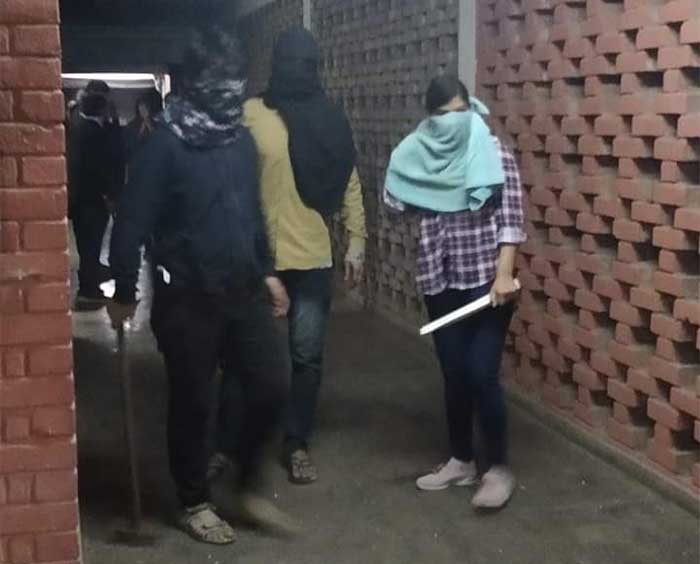
The recent attack on students and teachers at JNU by right-wing goons associated with Akhil Bhartiya Vidyarthi Parishad (ABVP) exposes the threat being felt by the BJP. The party which believes in an ideology of exclusion and hardly pays attention to the real concerns affecting people, JNU is a nightmare. JNU is seen as troublesome in building their agenda of Hindu Rashtra. For RSS which believes in utilizing students and teachers as tools in building the Hindu Rashtra, JNU becomes a stumbling block. The university has always fought against divisive ideology and stood for issues affecting public at large.
JNU has always been associated with questioning those in power, irrespective of the party in power – BJP, Congress, United Front or any other government. The democratic traditions of JNU encouraging debates, discussions and ideological fights stands contrary to the traditions of fascist forces who believe in imposing new agendas through use of coercion. The students and teachers have formed the backbone of building these democratic traditions in the campus.
The motto of ‘Study and Struggle’, which defines the university life helps in building socially sensitive citizens who are equally intellectually equipped. The university itself acts as a laboratory, where learning is both within classrooms & libraries as well as outside. The late night protests, lectures, post dinner mess meetings, discussions at the dhabha define the campus environment. It provides a safe environment for everyone. Student union elections are also a time, which teaches the process of conducting free and fair elections, in a non-violent environment but with a charged up ideological environment.
JNU also represents an idea of India, which is socially progressive, culturally diverse, politically liberal, and economically accommodative. This is in sharp contrast to an idea of India believed by RSS. The progressive admission policy of the university helps provide spaces to students from across regions, religions, castes, economic classes and socially marginalized groups. JNU represents a mini India. Apart from building a culture of respect for diversity, it also helps in inculcating spirit of debate and discussion, where ideological opponents need to be countered only through ideology and never through physical act of violence.
The progressive admission policy has provided opportunities to the most marginalized, those living in remotest of areas to become important players in society, economy and politics. It has produced good administrators, politicians, top academicians, social scientists, political scientists, sociologists, economists and historians. It has also produced Nobel laureate and Magsaysay award winners. Some of the student leaders such as Chandrasekhar and Kanhaiya Kumar have emerged from the poorest of backgrounds.
The progressive admission policy provides equality of opportunities for the socially and economically poor to not only find admission in university, but also to raise up. It helps break the traditional hierarchies based on caste, class, gender, religion and region. The progressive debates within the university by students and teachers also question traditional hierarchies built on caste, class, gender, religion and region.
The progressive values propounded by teachers and students in JNU becomes a threat for Rashtriya Swayam Sevak Sangh (RSS). It is built on an ideology which legitimises the traditional inequities. Any progress of the marginalized castes, classes and gender is not seen as a welcome development. Hence it is not surprising that when one section of the students and teachers call for low and affordable fee, the other section associated with RSS legitimises the fee hike. The fee hike including that of hostel and utility charges and its implications in excluding out the marginalised sections is never seen as a problem by RSS. Moreover, acquisition of higher education by marginalized groups is also seen as a threat, which can result in marginalized groups questioning traditional privileges.
JNU culture stands for a progressive India built on the ethos propounded by the constitution. The students and teachers always respond to public issues, which matter for the country. RSS in contrast stand against the values as propounded in the constitution. Hence it is not surprising there is always a conflict between ethos propounded in JNU and the ethos sought to be imposed by the ruling regime.
Fascism can only be built on foundations of obedient citizens and not vigilant citizens. JNU is seen as a place, which creates citizens who question. The questioning is also seen as anti-state and anti-national. The failure to ideologically convince students on issues of scholarships, fee hikes or on other matters such as CAA is seen as a challenge.
Hence the recent attack on JNU only brings out the real nature of the RSS, which believes in crushing progressive voices, even if it is through use of physical force. It also shows how much it believes in ending democratic traditions and imposing authoritarian traditions of Sangh Parivar.
T Navin is a Researcher and works with an NGO
SIGN UP FOR COUNTERCURRENTS DAILY NEWS LETTER










































